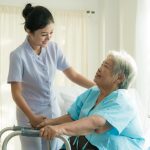 For those who find it a challenge to carry out the tasks needed in simple, day-to-day lives, home care services are available. Without help, without the guidance of a caring caregiver, they may be at risk for injury, malnourishment, depression and may experience a reduction in mental, physical and/or emotional health.
For those who find it a challenge to carry out the tasks needed in simple, day-to-day lives, home care services are available. Without help, without the guidance of a caring caregiver, they may be at risk for injury, malnourishment, depression and may experience a reduction in mental, physical and/or emotional health.
Options are also included in-home care programs, such as:
Companionhood
Even those who love living alone get lonely, and if you are housebound, the loneliness intensifies, let alone if you are mostly chair- or bedbound. One of the most requested facilities for home care is companionship.
The umbrella of “companionship” encompasses everything from taking part in social events together, playing games, reading, listening to music, cooking, walking the dog, listening to stories, crafting, and other customer-desired activities.
Reminders of Prescription
Even without dementia or Alzheimer’s, memory lapses are common as we age. For seniors who have been retired for a while, this is compounded because it is easy to lose track of dates or days without a regular schedule of work.
Since home care assistance does not legally administer drugs (which falls under the health care department), they can advise seniors to take their medicines as prescribed and call-in / pick up refills for medication.
Housekeeping in general
Cleaning the home, changing sheets and caring for animals and plants, reorganizing closets and cabinets to make them more available and more general housekeeping programs will help save resources so that seniors have more interest and stamina for activities and hobbies that are more enjoyable.
Daily house cleanings often ensure that living conditions are safe and sanitary, that burnt out light bulbs are replaced and that when maintenance concerns need to be resolved, responsible parties are notified.
Shopping & Meal Prep for Groceries
It is rarely any fun to cook for one. A lot of energy is also required to plan, cook and clean up. Connect that to the fact that many seniors can not easily get to the grocery store and you can see why malnutrition, loss of bone density, and muscle and joint weakening are a concern for seniors who live alone or are unable to cook nutritious meals.
Grocery and meal preparation programs ensure that nutritious food and snacks are always available, as well as tasty, easy-to-heat meals so that elderly people can have three square meals a day. Home care aides are also able to keep customers company when feeding, which causes healthier appetites.
Hygiene and bathroom basics
Another thing that can slip by the wayside is basic grooming, when one day fades into another, or if sore knees or a fear of falling make it harder to get dressed or take daily showers.
With these simple, everyday necessities, a caregiver is happy to support. Caregivers can also fix hair, file and trim nails and put on accessories, which allow seniors to feel like themselves again. Not only is it good to be bathed and dressed, but it helps to improve one’s spirit and overall health.
These are some of the programs most requested for home care. More information on the ins-and-outs of standard home care facilities can be found at our All Home Health.
